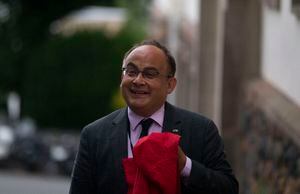Short and sweet
WE ARE back in the Royal Court for the States of Deliberation this week, albeit if members agree at the outset in a ‘hybrid’ format, allowing those not in the building to participate remotely.

Given the contents of the order paper, the meeting will, once again, be short and sweet, done and dusted in a day in all likelihood. And without the traditional Christmas lunch which has fallen victim to high Covid prevalence.
I understand that the meeting will begin with a statement from the Policy & Resources Committee providing an update on the Government Work Plan. Given the topic, I imagine that Deputy Heidi Soulsby will present it. No doubt the statement will seek to explain why the committee have missed their own deadline for finding and implementing by the year end a ‘permanent’ alternative to the Civil Contingencies Authority relying on the use of its regulation making powers in managing Covid. These powers rest on the CCA satisfying itself monthly that a state of emergency exists under the CCA law, which is a dichotomy when the CCA are telling us at exactly the same time that we all need to learn to live with Covid ‘responsibly’.
Frankly, it was an unrealistic deadline to set themselves so it’s no surprise it’s another one that has been missed. Having said that, the committee acted sensibly in not trying to debate whatever solution they’ve come up with at short notice, which appeared to be the plan until quite late in the day. To have attempted to have done so, would both have fed conspiracy theorists and been discourteous to the Assembly, almost certainly triggering a ‘sursis’ motion to delay debate. These are significant proposals impacting the community and the system of government in the ongoing management of the pandemic. As such, it should be uncontroversial to state that States members should be afforded the respect of having the normal period of time to consider any policy letter before debate.
Two ‘routine’ statements of up to 10 minutes from two committee presidents will follow. Deputy Al Brouard for the Committee for Heath & Social Care and Deputy Chris Blin for the Overseas Aid & Development Commission will have their 10-minute moment in the spotlight.

For the next 20 minutes, members will then compete for the presiding officer’s eye to be able to ask a question – or, if lucky, two – on any matter within the mandate of the committee. Frustratingly for me, the fact that Deputy Brouard is scheduled to give a statement, is the basis of the presiding officer ruling ‘out of order’ two sets of specific questions which I had lodged to Health & Social Care in relation to the Gedze Report on mental health services and the unpublished memorandum of understanding signed by the committee with the UK’s Home Office. This is because there is a provision in the rules prohibiting any question that relates ‘to the business of the day’.
I have asked the States’ Assembly & Constitution Committee to take a fresh look at this rule as it predates those which introduced routine committee statements, the creation of which I am sure were not intended to prohibit questions to presidents on matters of specific concern. The rules which deal with those questions allow each member up to two supplementary questions arising from the answer, during question time lasting an hour, giving the opportunity for greater scrutiny. Sacc’s response to this will be interesting: will it come down on the side of legitimate scrutiny by the Assembly and its members or on the side of government who, frankly, will always dislike any questions, arguing that having to respond to them is an expensive diversion of resources.
I am, however, still permitted to quiz Deputy Dudley-Owen on her committee’s decision to ‘stand down’ the shadow board of The Guernsey Institute. I am seeking to understand how that reconciles with a 2017 States resolution that provides there will be a ‘single board of governors’. I would also like to know whether the committee still wish to introduce ‘local management of schools’ to give school leaders more autonomy and, if so, on what timeframe.
My expectation is that the answers will be rather vague – perhaps restating an ambition to do so, but without any clear timelines citing, no doubt, other priorities, choosing to keep kicking this particular can further around the playground.
Frankly, the remaining business of the meeting is pretty technical and administrative. This includes a policy letter from the Policy & Resources Committee which seeks the Assembly’s approval to divest more powers to P&R in relation to entering into international agreements. I would expect this particular Assembly, with little dissent, to pretty readily buy into the pragmatic narrative that P&R have pitched for this further transfer of powers away from members as a whole to the senior committee.
That leaves a couple of policy letters from the Development & Planning Authority. These include looking to extend the range of exempt developments that do not require planning permission, as well as to facilitate the development of a number of redundant visitor accommodation sites. Some of this is cutting red tape – promised but not yet delivered by other committees. Some of their proposals will be controversial for some people. And all of what they propose will have a real world impact on the community.
It must be remembered that the DPA is not a ‘principal committee’ and yet in the first 14 months of this States – bar the latest decision in the two-decade-running saga (or more) of secondary education or minor U-turns, such as keeping the Ecclesiastical Court granting probate – it is noticeable that it is the one committee, without fanfare, taking the lead in actively developing alternative policy, rather than rolling on and implementing policy inherited from predecessor committees.





